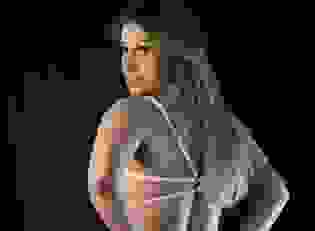- Romance
- Sharing Blankets
- Page 4
Note: You can change font size, font face, and turn on dark mode by clicking the "A" icon tab in the Story Info Box.
You can temporarily switch back to a Classic Literotica® experience during our ongoing public Beta testing. Please consider leaving feedback on issues you experience or suggest improvements.
Click hereThe three robbers weren't so fortunate. The man with the shotgun was already dead. Matthew's bullet had gone through his heart and he died shortly after falling off his horse.
The third man was also dead. The bullet had blown away the back of his head when it came out. The second was still alive, but barely. Matthew asked Doctor Maddox to look at the man, and once he did, he stood up and shook his head.
"You missed his heart, but you punched a hole through his left lung. He can't breathe now because he's just sucking air in and out of the bullet holes. He'll die before I can get him back to my office. Not much I could do for him anyway. Bullet must have hit an artery too. He's bleeding real bad."
Less than a minute after that, the man made a gurgling sigh and then lay still.
Elizabeth came out of the bank then, and walked up to Matthew and Doctor Maddox.
"They shot Mister Roberts, the bank teller, too. I thought he might be alive, but he's not."
Elizabeth looked at Matthew and saw that he was shaking. She took his hand.
"Matthew, we can't do anything more here. Let's go back to the store."
Once they were in the store, Matthew unloaded both revolvers and sat them on the counter.
"I'm sorry I had to use your revolvers, but I'm faster with a revolver than with a rifle or a shotgun. I'll clean them both before I leave so they won't rust."
Elizabeth put her arms around Matthew's neck again and looked him in the face.
"Matthew, they can rust solid for all I care and I don't want you to leave, not ever. I'll never feel safe again if you do. I don't know how you feel about me, but you must feel something or you wouldn't have done what you did."
Matthew gently pushed her away, but he held onto her arms.
"Elizabeth, you don't want a man like me. I've done the worst any man can do."
"Do you mean the war? I don't care which side you fought on or how many men you killed. What you did today showed me you're a good man."
Matthew shook his head.
"It was the war, but it wasn't all the killing I did. It was..."
Matthew had vowed to never tell anyone, but he did feel something for Elizabeth and he had realized he felt a lot more for her when he'd seen the two men trying to take her away. It wasn't right that he felt this way. He didn't deserve a woman like Elizabeth. He hoped when he told her the final truth, she'd understand and let him go.
"Elizabeth, I didn't join the Confederate Army to fight. I got myself appointed as a Chaplain. My father was a minister in Virginia and he said God was on the side of the Confederacy. I was a minister in a Virginia church too, but I wanted to minister to the soldiers to keep up their spirits.
"We were winning many of the early battles and that proved to me that God really was on our side. I preached a sermon every Sunday telling the men that their cause was just and that God was with them.
"Antietam was a nightmare of killing on both sides. It started in a cornfield where the Union sent shell after shell down into our men. I tried praying to God to stop the cannon fire, but it didn't stop. Instead, the Union attacked and the cornfield became filled with soldiers on both sides fighting with bayonets and rifle butts. So many men were killed in that cornfield that the corn stalks were red with blood.
"Late in the day we got orders to retreat, but even then, the killing didn't stop. The Union kept coming. When our encampment was being attacked, I picked up a rifle and started shooting at the Union troops. I know I killed at least four.
"I knew we'd lost a lot of men during the battle. The Union could have easily followed and killed us all as we retreated, but they didn't. A truce was declared so both sides could get the dead off the battlefields and so that the wounded could be exchanged. It wasn't until then that I found out just how many dead and wounded we had.
"Elizabeth, there were thousands and thousands of wounded and over a thousand dead. I tried to console the wounded and I helped bury the dead and said a prayer for them. As a Chaplain I was expected to do that, but I didn't really believe anymore. God wouldn't have let that many men be wounded and die if he was really there and watching out for his children.
"From that point on, I became a killer just like the rest of the men in the war. I learned how to shoot a revolver and I carried two until the war ended. I did preach a sermon every Sunday until Gettysburg, but it was just words to hopefully make the men feel better. They needed that because we were starting to lose most of the bigger battles. After Gettysburg, I stopped those sermons. I couldn't look men in the face and tell them God was on their side when I didn't believe God existed.
"It was after the war ended and I wasn't in battle after battle that I started to think about what I'd done. I wasn't shooting at anyone then, but I was still in a constant battle with myself. I couldn't decide if what I'd done was right or wrong. The Ten Commandments say, "Thou shalt not kill", but it also says "An eye for an eye and a tooth for a tooth". The Israelites fought many battles and the Bible says God was on their side.
"I knew my father would say I'd sinned, so I couldn't go home and face him. I started west to start a new life, but those thoughts wouldn't go away. All day long I'd argue with myself, trying to convince myself that I hadn't sinned, but that Commandment kept telling me I had. At night I had the dreams about battles and men dying. Drinking whiskey was a way to stop both the thoughts and the dreams.
"Elizabeth, you're a fine woman and a woman any man would be proud to call his wife, and you deserve a lot better man than I am. You deserve a man who won't either drink whiskey to stop the battle inside him or will keep you up at night with his dreams. You deserve a man who hasn't lost faith in everything he was taught since he was born. I'd only make your life as bad as mine. It's better if I just go and spare you all that."
Elizabeth looked up at Matthew.
"Matthew, I'd lost my faith too, until today. Today, when those men came into the bank and shot Mister Roberts and then grabbed me, that only made me sure there was no God. I'd been through so much in my life, and now it was happening again.
"Then, when you came out of the store, I realized that God was there watching out for me. He was working through you, using you to save me. I can't explain everything that happened to me before except that as my father used to say, "Sometimes we're not supposed to understand why God does what he does".
I think that's true for you too. God had you do what you did for a reason. It doesn't matter if you don't understand the reason. All you have to do is understand that what you did, you did because God wanted you to do it.
"What I think is that God brought us together to show us both that He's looking out for us. He brought you to me to protect me, and He brought me to you to help you understand. Don't leave me, Matthew. I can't bear any more of people I love being taken away from me."
Matthew decided to stay for one more day because it was too late to start walking. That day became another day when Elizabeth need help unloading another shipment, and that second day became a third and then a week, and then a month.
Each night, Elizabeth would sleep beside him, and after a week, the dreams came less frequently. Matthew didn't know why, but for some reason, having Elizabeth there let him sleep through the night most nights. If he did have a dream, she was there telling him it was just a dream and to go back to sleep.
Elizabeth had gone to church every Sunday since her father died, and after Matthew had saved her from the bank robbers, she often talked with Matthew about how she hoped the church would be able to find a new pastor. After Pastor Williams had been killed during the bushwhacker raid, one of the older men who had survived and was an elder of the church stepped in to fill the vacancy.
Horace Dean knew his Bible and said a sermon every Sunday, but he didn't have the confidence of the church members as would have a proper pastor. Horace had attempted to attract a new pastor, but so far he'd been unsuccessful. Lawrence had earned somewhat of a reputation because of the bushwhacker raid, and no ordained Pastor was willing to subject his family to any violence.
With her newly-found faith, Elizabeth listened to Horace's sermons and usually told Matthew about them when they had supper on Sunday night.
After that first month, Matthew had begun to believe that Elizabeth was right about God. Instead of trying to decide if he'd sinned or not, Matthew began searching for a reason God would have made him do what he'd done. He found that reason in an unexpected way.
It was on a Sunday morning that Elizabeth asked him to go to church with her. He'd said she would be embarrassed to be seen with him because of his tattered clothes. She'd just smiled and then brought him a new pair of trousers, a new shirt, and a new pair of boots.
"I ordered these the day after you saved me but I didn't think you'd wear them until now. I want you to go with me because I want people to see us together. I want them to see what the man who saved me really looks like."
Matthew had gone with her though he felt uncomfortable. It was the first time he'd been inside a church since before the war. To him, since he'd renounced his belief in God, it was like he was intruding on the sacred ground of the true believers.
He was listening to the sermon that Horace was preaching when he realized the sermon was a familiar passage taken from the Bible, a passage that had been a favorite of his father's. The topic of the sermon was how one should not give up hope because God is always with us, and Horace quoted the Book of James.
"My brethren, count it all joy when ye fall into divers temptations; Knowing this, that the trying of your faith worketh patience. But let patience have her perfect work, that ye may be perfect and entire, wanting nothing."
Horace then went on to explain that when James wrote the word perfect, what he meant was that patience was necessary for a man to become mature and whole, not that he was a perfect man.
"There has been only one perfect man in the world and that man is God himself. We have all sinned. Even Jesus himself said he had sinned. What James meant was that recognizing the sin and atoning for it makes us into what God intends for us to be."
That afternoon while Elizabeth was making a cake for their dessert that night, Matthew sat on the loading platform behind the store deep in thought.
Was that what the war was about, the testing of the people in order to make them better? Was that what his involvement in the war had been? Had God made him change from a minister to a soldier so he could experience both sides of man, the side that could be evil and the side that could be kind so he'd be a better man in the end?
Why would God do that? The only answer Matthew could imagine was that God had been unsatisfied with him and had put him through the hell of war to teach him.
Matthew then began thinking of the things he'd learned.
He'd learned that no matter how pious a man might be, in the right circumstances he could take another's life without regret. Indeed, he would celebrate the fact that he had killed another man.
He'd also learned that taking a life was not something that was easily forgotten. Some of the dreams he'd had were of seeing the eyes of the man he'd shot just as the bullet tore a hole in his heart. Those visions would never go away. They would just hide in his mind until something happened to let them out again.
One of the Ten Commandments was "Thou shalt not kill", but Jesus had explained what that Commandment meant in the Book of Matthew.
"Ye have heard that it was said by them of old time, Thou shalt not kill; and whosoever shall kill shall be in danger of the judgment: But I say unto you, That whosoever is angry with his brother without a cause shall be in danger of the judgment."
Didn't that mean that killing for a good cause wouldn't be judged by God to be a sin? Didn't it mean that killing Union soldiers in order to save the lives of the men he'd joined to save their souls wasn't a sin? Didn't it mean that because he felt strongly about Elizabeth, killing the bank robbers to save her wasn't a sin? Saving the life of a woman who'd done so much for him seemed cause enough to kill the bank robbers.
Was he just trying to justify the killing of so many men and that he'd done some of that killing, or was he just starting to see that all things are a part of God's plan? Matthew couldn't decide.
Matthew also reasoned there must be some reason he'd come out of the war alive and uninjured. He'd always had the feeling of guilt that he'd survived when so many other men hadn't. Did that mean God had let him survive because God had a plan for him?
Matthew then remembered the sermon Horace had given that morning. There was nothing wrong with his words or his topic. What was wrong was his words had no conviction, no fire that would cause the congregation to think and believe. That was because Horace didn't have the experience to relate God's word to people because he'd never really lived through the hell that men can put each other through in the name of a just cause.
By the time Elizabeth said supper was ready, Matthew had reached a conclusion that he wouldn't have considered even a month before. He was still unsure that he was right and needed someone to confirm what he now believed. Elizabeth was the only person he thought could do that because she'd been through so many trials in her own life. As they ate supper, Matthew related his thoughts to her.
"What Horace said this morning in his sermon, do you think God tests you to make you a better person?"
Elizabeth frowned.
"Yes, I believe that because He tested me. I don't know if I'm a better person though. Why?"
Matthew put down his fork.
"I did a lot of thinking this afternoon, thinking about what Horace said, and I think I understand some things now. I just need you to tell me if I'm wishing for something or if what I think makes sense."
Matthew let Elizabeth through the tangle of his thoughts and hoped she'd be able to understand. When he finished, he told her his conclusion.
"I think it's like you said. God brought you to me to help me understand. What I think I understand is that He made me join the war to teach me about people, and He then brought me to you so you could help me make sense of all that. I think His plan was for me to become a minister again after I'd seen how evil men can be toward one another."
Elizabeth had sat quietly and listened. When he finished, she took a deep breath.
"Matthew, I can't give you the answer you want me to give you. The only way you'll know is to try it and see if it's what you want to do. I think what you should do is go talk to Horace and tell him what you've just told me. He can give you a chance to prove it to him and to yourself."
The next Sunday morning, Matthew and Elizabeth went to church. Matthew wore the same pants and shirt that Elizabeth had given him, and he carried Elizabeth's father's big bible in his hand.
The service went according to the normal schedule with the reading of Bible passages by the elders and the singing of hymns and a prayer by Horace praising God and all his works. At the end of the prayer, Horace said, "Amen", and then looked out at the people sitting on benches.
"Folks, I don't have a sermon for you today. What I have is a man who was once a minister, then went to the war and lost his faith. He found God again here in Lawrence, and he wants to be our new pastor. He's here to tell you about his journey, what it means to him, and what it means to us all."
Elizabeth squeezed Matthew's hand as he stood and walked to the front of the church, took the two steps, and then stood behind the altar. He looked out at the people watching him for some indication of their feelings. What he saw was mostly blank stares that didn't tell him anything. Only Elizabeth was smiling, and that smile gave him the courage to clear his throat and begin speaking.
"You probably wonder why a man who has been to war and killed other men, and a man who killed three more men right here in Lawrence is standing here in this holy place and speaking to you. What I am going to tell you is the story of that man, how he once believed and then lost that belief.
"It is the story of a man who lost his soul to the evils of war and of drink, but found his soul because of one woman who thought that there was still good in the man. That woman is Elizabeth Orley, and is the woman who dragged me from the pit of despair and helped me see that God has a plan for each of us."
Matthew saw eyes open with interest then, and as he continued with his story, he began to see the nodding of heads as well as a few women dabbing at their eyes with handkerchiefs.
When Matthew had related all that had happened to him, he lifted the hymnal from the altar.
"Just as the hymn says, I once was lost, but now I'm found. I understand now that God's plan for us may cause us pain and anguish. The path of God is not always a path of happiness. It is sometimes a path of hurting, but that hurting is God's way of testing us and making us stronger. Such is God's way.
"I stand before you a man who has learned that God's path is not always one for us to understand, but it is always the path toward good's triumph over evil. I also stand before you a man who has learned that no matter how deeply into that evil a man may fall, God's hand is always outstretched to pull him from the pit and back into the fold.
"What I ask of you today is to allow me to teach you about what I've learned by becoming your pastor. Mister Dean believes you will accept me after hearing my story. I truly hope that is the case, for I believe I have found my calling in life. Let us pray."
After the prayer ended, the congregation filed out of the church until only the elders, Matthew and Elizabeth were left. The elders spoke for a few minutes and then Horace walked up to Matthew and shook his hand.
"Mister Martingale, we're all in agreement that you should be our pastor. That story you told was as good a sermon as I've ever heard."
When Horace walked outside, Matthew turned to Elizabeth and asked what she thought. Elizabeth smiled.
"I think you'll make a really good pastor. The people understood what you said and they believed you."
When they walked out of the church, Matthew was surprised to see the congregation lined up and waiting. He turned to Elizabeth and asked why they were there. She smiled again.
"I think they're waiting to meet their new pastor. As they were leaving, I heard some of the people saying they hadn't been moved by a sermon so much since Pastor William's last sermon."
It took half an hour before people stopped shaking Matthew's hand and slowly went back to their homes. As he and Elizabeth walked back to the store, she slipped her hand in his. That was enough for Matthew to tell her the other thing he'd decided.
"Elizabeth, if I'm to be the pastor of the church, I should have a wife to help me. You once said you didn't want any man other than me to help you. If I said I didn't want any other woman than you to help me, what would your answer be?"
Elizabeth stopped walking and put her arms around Matthew's neck.
"I would say that I would be happy to be your wife."
The next Sunday, Horace again gave the sermon. That was because Matthew and Elizabeth were to be married that afternoon. After some discussion among the church elders about who could marry them, the agreement was that in the absence of another pastor, Horace could marry them.








